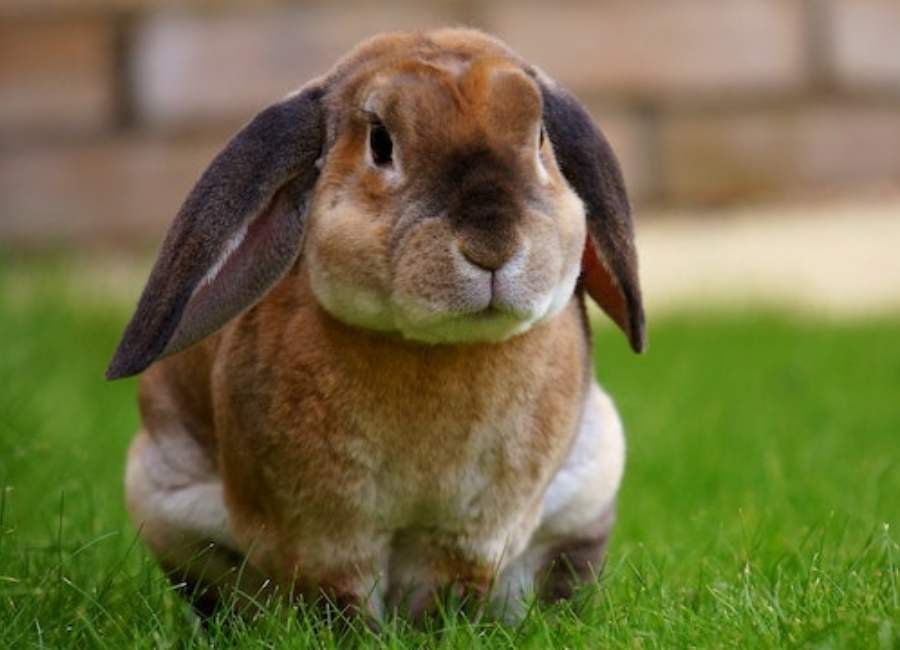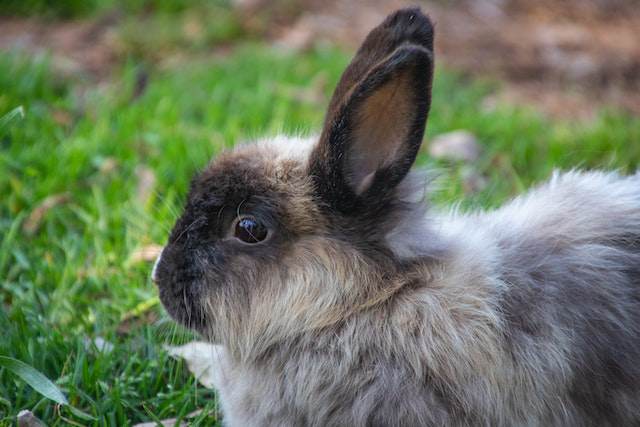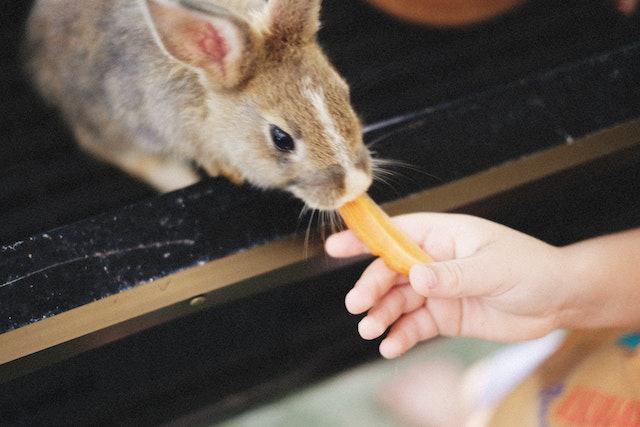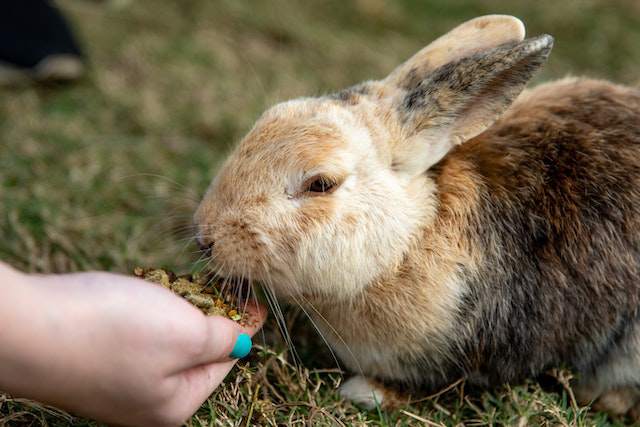12 Potential Signs of a Depressed Rabbit & Tips

Are you worried that your pet rabbit might be feeling down? Just like humans, rabbits can experience depression, and it’s important to recognize the signs so you can help them feel better.
In this blog post, we’ll explore the signs of a depressed rabbit and offer tips on how to cheer them up.
What Is Rabbit Depression?
Rabbit depression refers to a condition in rabbits characterized by a persistent and noticeable change in behavior, mood, or increased level of sadness.
It can manifest as a lack of interest in activities, reduced appetite, social withdrawal, and lethargy.
Rabbit depression can be caused by various factors, including environmental stress, illness, social isolation, or the loss of a companion.
Signs of a Depressed Rabbit
The following are some potential signs of a depressed rabbit:
1. Changes in Eating Habits
Rabbits are creatures of habit, and their eating habits are a good indicator of their well-being.
A rabbit that suddenly eats less or stops eating altogether might be experiencing emotional distress.
Loss of appetite in rabbits could be linked to stress, illness, dental problems, or a combination of these factors.
It’s essential to monitor their food intake closely and seek veterinary attention if you notice a significant change.
2. Lethargy
A vibrant and active rabbit suddenly becoming lethargic is concerning. Rabbits are naturally curious and energetic creatures.
If you notice your rabbit spending more time huddled up and less time exploring its environment, it might be an indication of emotional distress.
Lethargy often accompanies a lack of interest in their surroundings and can lead to physical health problems if left untreated.
3. Change in Vocalization
Rabbits communicate through a variety of sounds, from soft purring to loud thumping.
If your rabbit becomes unusually quiet or starts making distressed noises that are out of character, it might be an attempt to express their emotional state.
Pay attention to these changes in vocalization, as they can provide valuable insights into their feelings.
4. Social Withdrawal
Rabbits are social animals that thrive on companionship. If your rabbit, which used to enjoy human interaction or playing with other rabbits, starts avoiding these interactions, it could signal depression.
Rabbits form strong bonds with their companions, whether human or fellow rabbits. A sudden withdrawal from social interactions might mean they’re not feeling emotional well.
Learn more about signs of a happy rabbit.
5. Reduced Grooming
Rabbits are known for their meticulous grooming habits. If your usually well-groomed rabbit starts showing signs of neglecting its coat, it could point to a lack of interest or motivation – classic signs of depression.
Grooming not only keeps their fur clean but also helps them maintain their bond with other rabbits and humans. A lack of grooming can indicate a withdrawal from these social interactions.
6. Unusual Aggression or Apathy
Depressed rabbits might show behavioral changes that swing between aggression and apathy.
Some rabbits may become unusually aggressive as a way to assert control over their environment, while others may become passive and indifferent due to their emotional state. Both extremes are indicative of their struggle to cope with their emotions.
7. Loss of Interest in Toys and Play
Rabbits are playful creatures that enjoy interacting with toys and engaging in activities.
If your rabbit loses interest in toys, games, or even exploring their environment, it could be an indication of their emotional state.
A lack of enthusiasm for playtime can signal that they’re not finding joy in activities they once enjoyed.
8. Physical Ailments
Depression can have physical manifestations in rabbits. Weight loss is a common symptom, as depression may cause them to eat less.
Additionally, a depressed rabbit’s fur quality might deteriorate due to neglect, leading to issues like matting and poor coat condition.
Gastrointestinal issues might also arise due to changes in their eating habits and overall stress levels.
9. Destructive Behavior
Bunnies dealing with depression might resort to destructive behaviors as a way to cope.
Chewing on furniture, wires, or objects they wouldn’t normally target is a common sign.
This behavior can be frustrating for caregivers, but it’s essential to address the root cause rather than just the symptoms.
10. Hair Pulling or Over-Grooming
Just like humans, rabbits can develop coping mechanisms when faced with emotional distress.
Over-grooming or fur-pulling can be a response to stress. This behavior can lead to skin problems and even open sores.
If you notice your rabbit engaging in excessive grooming to the point of harming itself, it’s crucial to address the underlying emotional issues.
11. Changes in Litter Box Behavior
Rabbits are generally clean animals that prefer to use a specific spot for elimination. If your rabbit suddenly starts urinating or defecating outside the litter box, it’s a potential sign of distress.
This change could stem from feelings of unease, as rabbits often use marking behaviors to communicate their emotions or assert territory.
12. Excessive Hiding
While rabbits do enjoy having hiding spots, excessive hiding can be concerning. It’s normal for rabbits to seek shelter and feel safe in enclosed spaces, but if your rabbit spends an unusually long time hidden away and avoids interaction, it might be a sign of depression. Hiding can be a way for them to cope with stress or unease.
Potential Causes of Depression in Rabbits

Depression in rabbits can have various causes. Here are some common factors that can contribute to depression in rabbits:
- Lack of social interaction: Rabbits are social animals and thrive on companionship. Solitary confinement or the absence of social interaction with other rabbits or humans can lead to depression.
- Boredom and lack of mental stimulation: Rabbits are intelligent creatures that require mental stimulation to stay happy and engaged. A lack of toys, activities, and environmental enrichment can contribute to depression.
- Improper diet: A poor diet lacking essential nutrients can negatively affect a rabbit’s overall health and well-being. Nutritional deficiencies can lead to physical discomfort and contribute to depressive symptoms.
- Inadequate living conditions: Rabbits need a spacious and clean living environment with plenty of room to hop, stretch, and explore. Living in cramped or dirty conditions can cause stress and lead to depression.
- Lack of exercise: Rabbits are naturally active animals and require regular exercise to maintain their physical and mental health. A sedentary lifestyle without opportunities for exercise can contribute to depression.
- Pain or illness: Undiagnosed or untreated pain or illness can cause rabbits to become depressed. Chronic health conditions, dental problems, or injuries can lead to discomfort and a decline in overall well-being.
- Changes in routine or environment: Rabbits are creatures of habit and thrive on a consistent routine. Significant changes in their environment, such as moving to a new location or changes in their daily routine, can cause stress and contribute to depression.
- Grief or loss: The loss of a bonded companion, whether it’s another rabbit or a human caregiver, can trigger feelings of grief and depression in rabbits. They form strong emotional attachments and can experience profound sadness when separated from loved ones.
- Lack of mental and physical stimulation: Rabbits are naturally curious and need mental and physical stimulation to stay mentally and physically fit. A lack of opportunities for exploration, play, and interaction can contribute to depression in rabbits.
It’s important to note that depression in rabbits can manifest differently than in humans, and professional veterinary care should be sought if you suspect your rabbit is depressed.
A veterinarian can provide a proper diagnosis and recommend appropriate treatment options to help alleviate depressive symptoms and improve your rabbit’s well-being.
How to Help a Depressed Rabbit

Helping a depressed rabbit requires patience, care, and understanding. Here are some ways to assist with the well-being of a depressed rabbit:
- Observe Behavior: Pay close attention to your rabbit’s behavior. Look for signs of depression, such as decreased appetite, lethargy, excessive grooming, or lack of interest in activities.
- Maintain a Consistent Routine: Establishing a consistent daily routine can provide a sense of security and stability for your rabbit. Stick to regular feeding times, playtime, and bedtime. Rabbits thrive on predictability, and a stable routine can help reduce stress and anxiety.
- Create a Safe Environment: Provide a safe and comfortable space for your rabbit. Ensure they have enough room to move around, access to fresh water, and a clean living area.
- Social Interaction: Spend time with your rabbit and provide social stimulation. Engage in gentle play, talk to them, and provide companionship. Rabbits are social animals and thrive with interaction.
- Healthy Diet: Offer a balanced and nutritious diet to your rabbit. Consult with a veterinarian to ensure they are receiving the right amount of hay, fresh vegetables, and a limited amount of pellets.
- Enrichment Activities: Provide mental stimulation and enrichment for your rabbit. Offer toys, tunnels, and other interactive items to keep them engaged and entertained.
- Grooming: Regularly groom your rabbit to maintain their health and well-being. Brush their fur, trim their nails, and check for any signs of illness or discomfort.
- Veterinary Check-ups: Ensure your rabbit receives regular veterinary check-ups. A professional can assess their physical and mental health and provide appropriate treatment if necessary.
- Bonding Opportunities: If your rabbit is the only pet, consider introducing them to a compatible rabbit companion. Rabbits often benefit from the company of another rabbit, as it provides social interaction and reduces loneliness.
- Offer Emotional Support and Patience: Be patient and understanding with your depressed rabbit. Offer them gentle reassurance, love, and emotional support. Give them time to heal and recover from their depressed state. If their symptoms persist or worsen, consult a veterinarian for further guidance.
- Seek Professional Help: If your rabbit’s depression persists or worsens, consult with a veterinarian or an animal behaviorist who specializes in rabbits. They can provide additional guidance and support tailored to your rabbit’s specific needs.
Remember, each rabbit is unique, and the steps to help a depressed rabbit may vary. It is crucial to seek professional advice and adapt your approach based on your rabbit’s individual circumstances.
Learn more about how to know if your rabbit doesn’t like you.
Preventing Depression in Rabbits

To prevent rabbit depression, here are some tips:
1. Provide a suitable living environment: Rabbits are social animals that require plenty of space to hop around and explore. Ensure that their enclosure is spacious, well-ventilated, clean, and free from any potential hazards.
2. Offer mental and physical stimulation: Rabbits need mental and physical stimulation to prevent boredom and depression. Provide them with toys, tunnels, and hiding spots to keep them engaged. Regular playtime and interaction with their human caregivers are also important.
3. Maintain a balanced diet: A healthy diet is crucial for a rabbit’s overall well-being. Provide them with a balanced diet that includes fresh hay, fresh vegetables, and a limited amount of pellets. Avoid feeding them a diet high in carbohydrates or treats that are not suitable for rabbits.
4. Ensure social interaction: Rabbits are social animals that thrive in the company of other rabbits or even humans. If you have a single rabbit, consider providing them with a companion or spend quality time interacting with them daily.
5. Regular veterinary check-ups: Regular veterinary check-ups are essential to ensure your rabbit’s physical and mental health. A veterinarian can identify any underlying health issues or signs of depression and provide appropriate treatment or guidance.
By following these tips, you can help prevent rabbit depression and ensure that your furry companion leads a happy and healthy life.
Learn more about showing your rabbit you love them.
Related Questions
How can I tell if my rabbit is depressed?
There are a few signs that may indicate that your rabbit is feeling down. These can include a decrease in appetite, lethargy, hiding more often, reduced grooming, and a lack of interest in toys or interaction.
What can cause depression in rabbits?
Rabbits are social animals, and isolation or lack of companionship can lead to depression. Other factors such as changes in their environment, health issues, or a lack of mental stimulation can also contribute to their emotional well-being.
Can rabbits experience grief or sadness?
Yes, rabbits can indeed experience grief and sadness. They form strong bonds with their human caregivers and other rabbits, so the loss of a companion or a change in their environment can have a significant impact on their emotional state.
How can I help my depressed rabbit?
It’s important to provide your rabbit with a stimulating and enriching environment. Spend quality time with them, offer toys or puzzles to keep them mentally engaged, and consider getting them a companion if they are living alone. Consulting a veterinarian experienced in rabbit care is also advisable.
Should I consult a veterinarian if I suspect my rabbit is depressed?
Yes, it’s always a good idea to consult a veterinarian if you notice any changes in your rabbit’s behavior or if you suspect they may be depressed. A vet can help rule out any underlying health issues and provide guidance on how to improve your rabbit’s well-being.
Can changes in diet help a depressed rabbit?
While diet alone may not cure depression in rabbits, a balanced and nutritious diet is essential for their overall health. Ensure they have a diet rich in hay, fresh vegetables, and a limited amount of pellets. However, addressing their emotional needs is equally important in helping a depressed rabbit
Conclusion
In conclusion, it’s crucial for rabbit owners to be aware of the signs of depression in their furry friends. From changes in behavior to decreased appetite, these indicators should never be ignored. Remember, rabbits are sensitive creatures who thrive on love, attention, and a stimulating environment.
If you notice any of these signs in your rabbit, don’t hesitate to seek professional help from a veterinarian experienced in rabbit care. By addressing depression early on, you can ensure your rabbit’s happiness and well-being. Let’s be proactive and give our fluffy companions the love and support they need!
